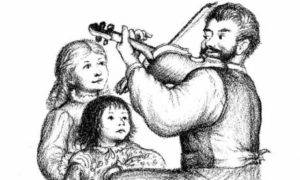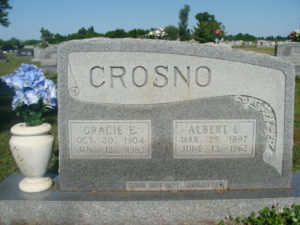Grammatical pet peeve. Misplaced apostrophes. My father, God rest his soul, once commissioned a huge sign that read Season’s Greetings From The Teachout’s. I secretly attempted to paint out that damned apostrophe, but to no avail. It caused me years of annual adolescent embarrassment, though I’m pleased to say that I wasn’t enough of a smartass to tell my father about it….
Read the whole thing here.



 My mother’s parents were born right around the turn of the twentieth century. Albert Crosno, Sr., my maternal grandfather, came from Decaturville, a rural Tennessee town whose current population is 867, and spent the bulk of his later life in Diehlstadt, a rural Missouri town whose current population is 161. He served as a private in World War I, became a dirt farmer after the war, then went to work in a shoe factory. After hours he played the banjo, listened to the Grand Ole Opry on the radio, and doted on his two sons and four daughters.
My mother’s parents were born right around the turn of the twentieth century. Albert Crosno, Sr., my maternal grandfather, came from Decaturville, a rural Tennessee town whose current population is 867, and spent the bulk of his later life in Diehlstadt, a rural Missouri town whose current population is 161. He served as a private in World War I, became a dirt farmer after the war, then went to work in a shoe factory. After hours he played the banjo, listened to the Grand Ole Opry on the radio, and doted on his two sons and four daughters. I’ve been thinking about my grandparents ever since I started reading
I’ve been thinking about my grandparents ever since I started reading  I suppose you could have called Gracie and Albert “hillbillies,” but you would have been stretching a point to do so. Nor did they have much in common with the latter-day hillbillies portrayed in Vance’s book. They were good country people, Scotch-Irish Bible Belt Christians (my mother was baptized in a river) who scratched their way through the Great Depression and World War II, passing on their homespun, hard-tested values to their children, who in turn raised their own children in much the same way. What I am, I owe to them. As I
I suppose you could have called Gracie and Albert “hillbillies,” but you would have been stretching a point to do so. Nor did they have much in common with the latter-day hillbillies portrayed in Vance’s book. They were good country people, Scotch-Irish Bible Belt Christians (my mother was baptized in a river) who scratched their way through the Great Depression and World War II, passing on their homespun, hard-tested values to their children, who in turn raised their own children in much the same way. What I am, I owe to them. As I 
 Musicals don’t have to be first-rate to be fun. “Bye Bye Birdie,” a peaweight farce about the coming of rock and roll to Sweet Apple, Ohio, is the quintessential case in point. While it was a hit on Broadway in 1960 and remains popular to this day with high-school and amateur theaters, professional revivals are increasingly rare, and the Roundabout Theatre Company’s 2009 production was a major meltdown (only one of the stars could sing). But “Bye Bye Birdie” still has undeniable charm, as well as a well-crafted book by Michael Stewart and a Charles Strouse-Lee Adams score that sports two blue-chip standards, “A Lot of Livin’ to Do” and “Put on a Happy Face.” Stage it well and you’ll send everybody home with a smile. Stage it really well—the way Goodspeed Musicals is doing—and they’ll go home laughing out loud.
Musicals don’t have to be first-rate to be fun. “Bye Bye Birdie,” a peaweight farce about the coming of rock and roll to Sweet Apple, Ohio, is the quintessential case in point. While it was a hit on Broadway in 1960 and remains popular to this day with high-school and amateur theaters, professional revivals are increasingly rare, and the Roundabout Theatre Company’s 2009 production was a major meltdown (only one of the stars could sing). But “Bye Bye Birdie” still has undeniable charm, as well as a well-crafted book by Michael Stewart and a Charles Strouse-Lee Adams score that sports two blue-chip standards, “A Lot of Livin’ to Do” and “Put on a Happy Face.” Stage it well and you’ll send everybody home with a smile. Stage it really well—the way Goodspeed Musicals is doing—and they’ll go home laughing out loud.